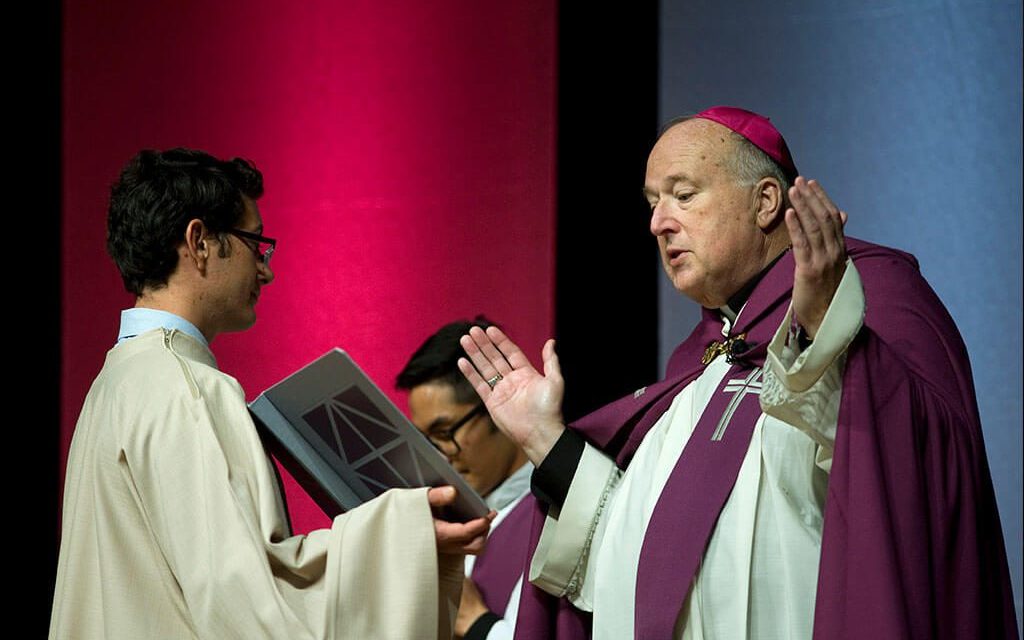(This is the first of a series of posts on Bishop McElroy’s speech.)
Bishop Robert McElroy of San Diego gave what is certainly meant to be a significant, defining speech about the American church. Like a previous address he gave at the Catholic University of America, on the three kinds of “erroneous autonomy” that afflicts American society, Bishop McElroy paints on a large canvas and brings out extremely important points for the future of the Church. The speech coincides with the USCCB annual November meeting in Baltimore, and so we thought a series of perspectives on the bishop’s talk would be timely.
My perspective will be to try to understand Bishop McElroy’s speech as a whole, and it will be an approach that I think is typically the best approach for theologians writing about bishops (including the bishop of Rome): critical appreciation. Yet “Critical appreciation” is itself a challenging thing at this point in the Church’s history. Is a critical appreciation of Bishop McElroy’s speech disallowed? If one criticizes this or that point, is one inevitably tarred as “anti-Francis” or (worse) “conservative”? If one praises this or that point – or more to my point, the overall direction of the speech to wake up the church – is one thereby “suspect” or (worse) in league with flat-out “idolators”? Such an atmosphere, besides lacking the charity that ought to accompany discourse about the Church, weaponizes speech and emboldens those who want the Church to be a simple battle between the forces of good and the forces of evil. Thus, it is the antithesis of the synodality that the bishop suggests will save the moribund church.
Bishop McElroy makes certain fundamental points on which there is widespread agreement. First and foremost, a post-Vatican II church is a church where all the members of the body take up the serious task of faithful missionary discipleship. The Church must become a place of “co-responsibility and participation.” It’s not a top-down program. Under the language of the “universal call to holiness,” this is arguably the single most important innovation of Lumen Gentium. Secondly, such a direction for the Church requires the break-up of certain sorts of “clericalism,” especially forms of clericalism that encourage the two afflictions the bishop names as a “bunker mentality” and a “culture of maintenance.” There is simply no doubt that the self-defense of the clerical class has made the horror of clergy sexual abuse a far worse thing. And my understanding is that many bishops and priests themselves express frustration with the amount of time, energy, and money they must expend just to “keep the doors open” – by which is meant, keep doing “what we’ve always done.” So by all means, let’s get out of the bunker and let’s stop expending so much energy on a “culture of maintenance.” Indeed, there is plenty of literature out there pushing any kind of large organization to overcome these barriers. Thirdly, Bishop McElroy clearly envisions a church where people live out the fullness of their faith with joy, rather than foregrounding a sense of self-righteous superiority and judgmentalism that is seen as contrary to the Gospel. Like Francis’s “doctors of the law” image, McElroy recognizes that too often some take delight in condemning sinners who are not themselves. Indeed, too often, the sins singled out for condemnation are sins that are completely “other” to them, to which they have no temptation. (Begin to talk about the clear sin of the regular consumption of luxuries, identified clearly in Scripture and tradition, papal encyclicals and Catechism, and suddenly the “judgmentalism” mysteriously ceases!) Finally, the bishop imagines that such a church should build “affective pathways” to link the Church’s moral witness on issues of life and sexuality with its witness on teaching about social justice and environment, instead of constantly importing the confused polarizations of our political discourse into the Church by pitting these against one another. The data are all too clear that American Catholic views on particular issues track a person’s party identification much more consistently than their Catholicism. And then it is all too easy to think that those “other” Catholics (not one’s own tribe, however) are just tools of their political party, rather than faithful missionary disciples in the public realm.
With all this, everyone should agree. I certainly do. Not only is Bishop McElroy right, he is highlighting exactly the big, meaty issues that need to be highlighted and foregrounded. Certainly this speech is prophetic and timely in suggesting the need for a re-energizing of a church “adrift.” But I’m sure the bishop has borrowed this image of a church adrift from Peter Steinfels’ benchmark volume from 2004. That volume emerged from a similar crucible, at least in terms of the 2002 clergy abuse scandals. What I do not recall from the volume is any mention of “synodality.” If Bishop McElroy is naming accurately and prophetically the problems of the American Church, how is “synodality” the key to the solution?
My sense is that we ought to understand synodality as penultimate, as ultimately dependent on something else deeper. The bishop defines the synodal pathway as:
one filled with deep and broad consultation, the willingness to accept arduous choices, the search for renewal and reform at every level, and unswerving faith in the constancy of God’s presence in the community.
Great. This pathway is ultimately valid because of the common baptismal identity of all members of the Church:
Rooting the entire process of synodality in the baptismal call of all believers, Francis holds that “all of the baptized, whatever their position in the church or their level of instruction in the faith, are agents of evangelization, and it would be insufficient to envisage a plan of evangelization that would be carried out by professionals while the rest of the faithful would simply be passive recipients.” Quite bluntly, the Holy Father states, “the flock has an instinctive ability to discern the new ways that the Lord is revealing to the church.”
Also good. But let’s examine the claims here. Who are “the flock”? Which of their “instincts” arise from the “new ways the Lord is revealing”? What “arduous choices” must be accepted? According to Pew, the Catholic vote in the US overall went 52/45 to Trump, and while the Catholic numbers are not broken out by church attendance, one can imagine the numbers skew further toward Trump, as they do in the overall survey for all faith (weekly attenders go much more for Trump). One need not spend much time online to view the “co-responsibility and participation” exercised by lay Catholics – quite often young lay Catholics – in energetically seeking reform and revival in the American Church. They certainly want the Church to make “arduous choices”! But I suspect they are different “arduous choices” than those favored by readers of the bishop’s speech in NCR. Whose “judgmentalism” is at issue? I have plenty of evidence that, even at Catholic University, students who stay silent under the threat of “judgmentalism” are as likely to be those who follow Church teaching as those who disagree. And isn’t the use of language like “anti-Francis Americans” judgmental? (I should note: part of the point here is that there is a proper place for judgment, and those who actively believe that Francis is a kind of anti-pope should absolutely be subjected to judgment in a non-ultimate, hope-for-mercy kind of way.)
That is to say, the categories of analysis proposed – like “synodality”, “judgmentalism,” a “culture of defeatism,” a need for “listening” or “co-responsibility” – are penultimate categories that require further specification. When they don’t get further specified, they too easily can turn into stereotypes that defeat the whole purpose of synodality. In the above quote from the Holy Father, there is a contrast between an “evangelization carried out by professionals” and delivered to “passive recipients” and the kind of synodal path that trusts in “the instinctive ways” of the people. In teaching Francis’s encyclicals, I have been struck by how often he uses these kinds of rich contrast-images. They are all over Evangelii Gaudium, for example. But the core teaching of Laudato Si’, the emergence of the “technocratic paradigm” is also delivered via a set of contrast-images, rather than by a precise definition. This is a technique that reflects Francis’s deep acquaintance with the Scriptures (Jesus’s parables are filled with exactly these kinds of contrast-images), as well as his love of and genius with literature (rather than academic exposition, the forte of the past two papacies).
But the contrast-images themselves are… well, they are kind of somewhat exaggerated stereotypes. Think of how ridiculous that self-congratulatory Pharisee sounded in the readings a couple weeks ago! When these images become codes for identifying “those people” and “what those people are like,” they become the opposite of what Jesus intends. Obviously, if we go around thinking, “thank God I am not like those pharisaical, judgmental Catholics,” we undermine the whole purpose of the parable!
Instead, the images should be used first and foremost as tools for individual scrutiny. All of us – bishops, priests, and laity – need to ask ourselves individually: do I live out the full call to Gospel holiness? Do I protect my power and privilege instead of taking risks for the Gospel? Do I use the moral teachings of the Gospel largely as a tool to criticize others? And do I selectively appropriate the Church’s witness so as to focus on some aspects of the moral and political life to the neglect of others?
An honest assessment of these questions in our own lives would, I think, be a matter of stopping the incessant “othering.” I know this is a naïve fantasy of mine, but I wish the bishops – who I presume to be sincere in their love of Christ and the Church – could somehow find it in their hearts to recognize that their collective leadership would be so much better if they could build alliances among themselves. I think the bishop’s conference is enriched because there are different sorts of people in it. It’s better that way, because it’s not just a matter of one faction or another trying to control something. In my own world, both professional and personal, I try (imperfectly but really) to live so that I am not immersed in one echo chamber or another, but share in the lives of my brothers and sisters in Christ beyond any immediate disagreements. It’s better that way – the Church, the one that actually exists, really is bigger than these.
But I do so ultimately not because of my commitment to synodality, or even to some sense of the instinctive rightness of the Spirit in everyone. I am only too aware that my own sense of “instinctive rightness” is not always so right! And certainly there’s ample evidence in the history of humanity (and even of the Church) that some sort of appeal to “the people” is necessary but not sufficient.
Rather, I am committed to that bigger Church because I fervently believe in the Church as the sacrament of the eschatological unity of the human race. Maybe that’s too fancy, but it is not an abstract concept like synodality or co-responsibility. It means that, in the end, God seeks relentlessly to overcome every obstacle we set up and find ways to bind us all together. We do not find ourselves right now in that unity – but it’s the promise, it’s the hope, it’s what we believe will triumph in the end (=eschatologically!). Right now, we find ourselves – sometimes more, sometimes less – in conflict with one another. The hard work is that God’s desire for peace among us does mean arduous and searing choices, not magical formulae for solutions: it means we all should find ourselves “humbled” (or even humiliated!), we should all find how hard mercy and forgiveness is to give (and to receive), we all should see we are asked by Christ to live in ways that the disciples rightly think are “impossible” – beyond what we think we can be. If the Gospel is love, it is a love that is “harsh and dreadful” – not for fire-and-brimstone reasons, but because it is love directed relentlessly at the sin in us and in our world and in our societies. It wears us down, but it purifies us like the “testing” of metals meant in the Scriptures. It is, however, a source of joy exactly because it is not a force that seeks to destroy us, and indeed, it is backed by the promise that God’s dreadfully beautiful love is the only force that can withstand other forces that really do seek to destroy us.
Synodality – certainly in comparison to any top-down imposition – can certainly be a way toward this. It would especially be a way toward it if it exemplifies this kind of hard love that faces real conflict. But it is only a means. It is penultimate. Synodality is not the end. The end is to be the Church Lumen Gentium calls us to be, the sacrament of the unity of the human race, via living out our baptismal call to holiness. Right now, in the American church, there are many people seeking to do this, and these many do not agree on everything. Those disagreements matter. But they are penultimate. The unity matters more. If we don’t keep that in mind, it really is just self-referential ecclesial politics.





Trackbacks/Pingbacks